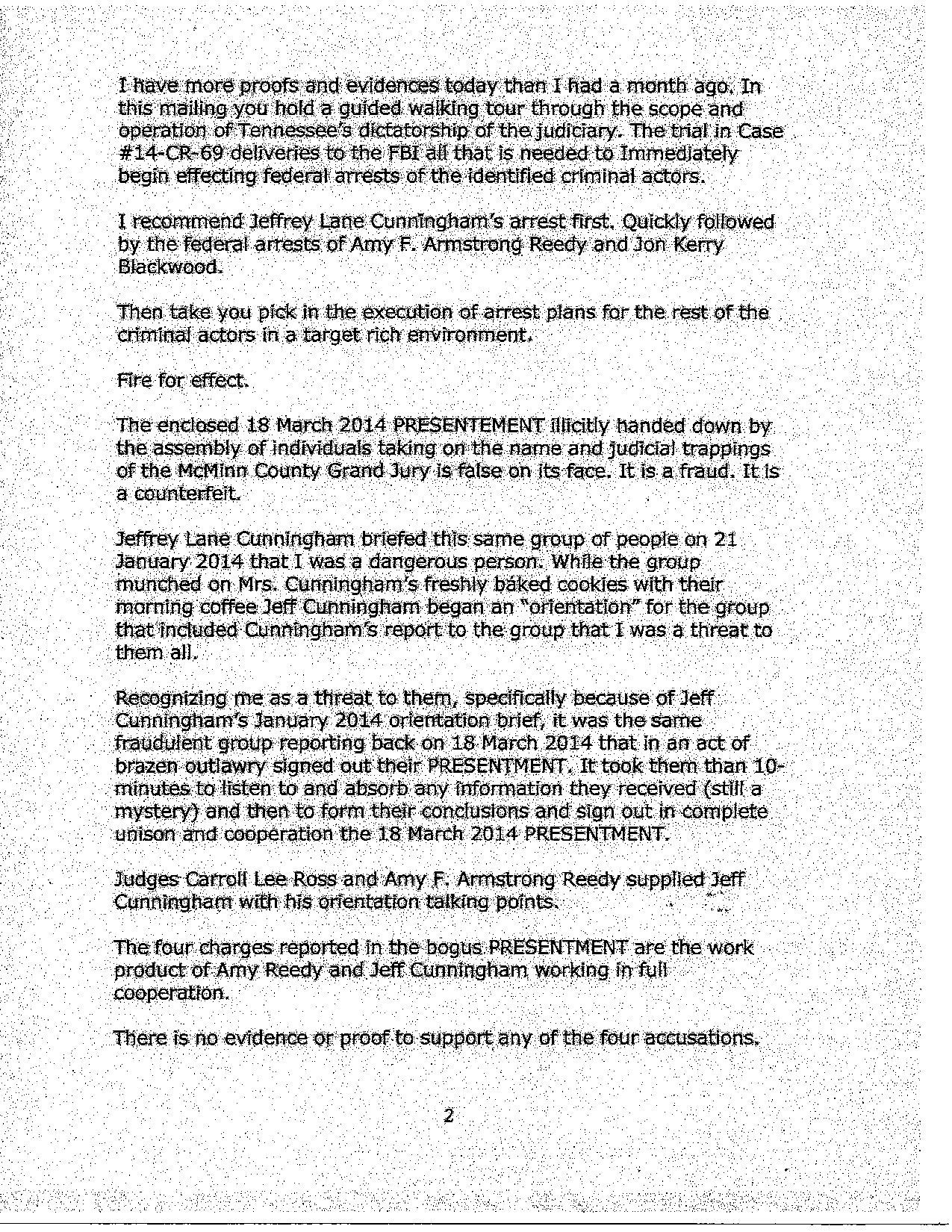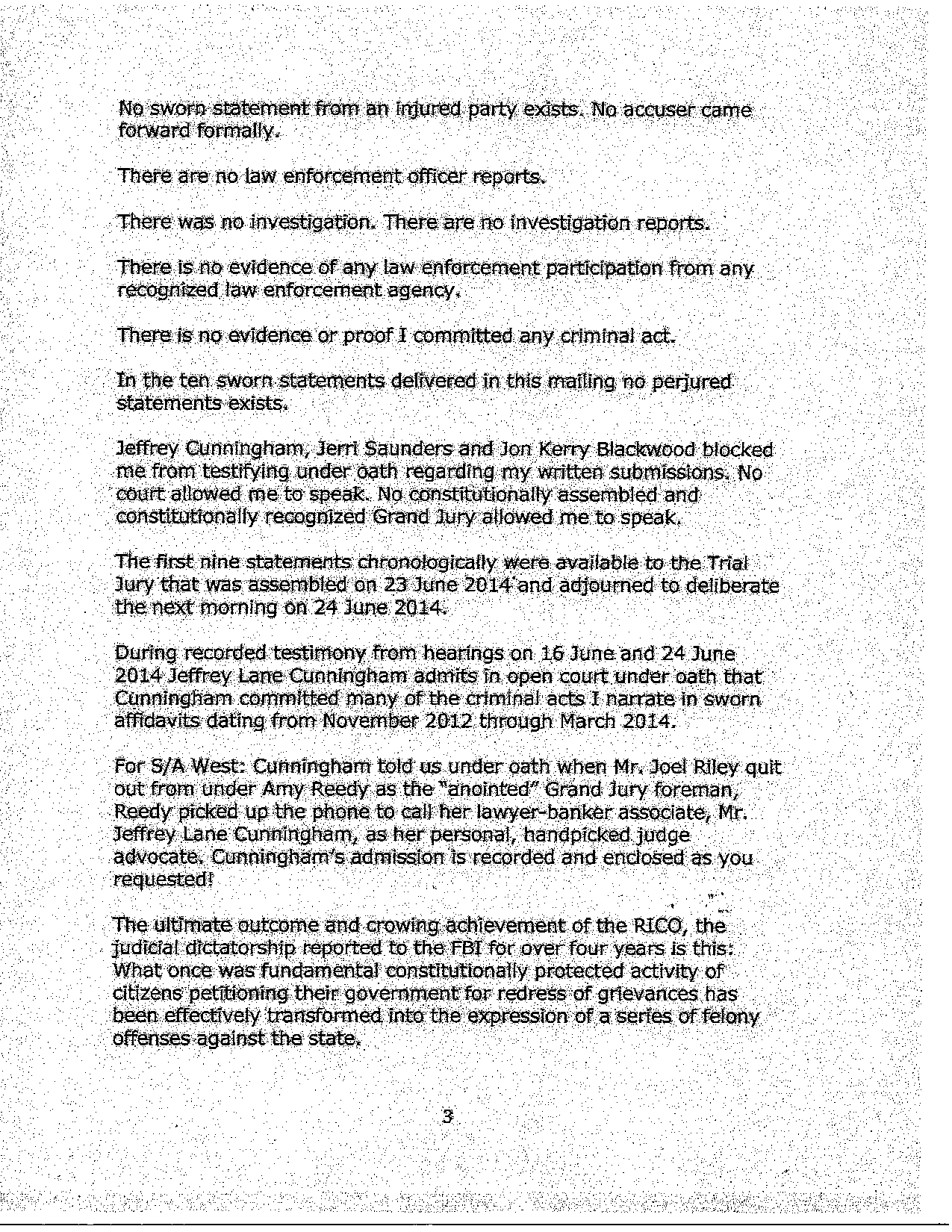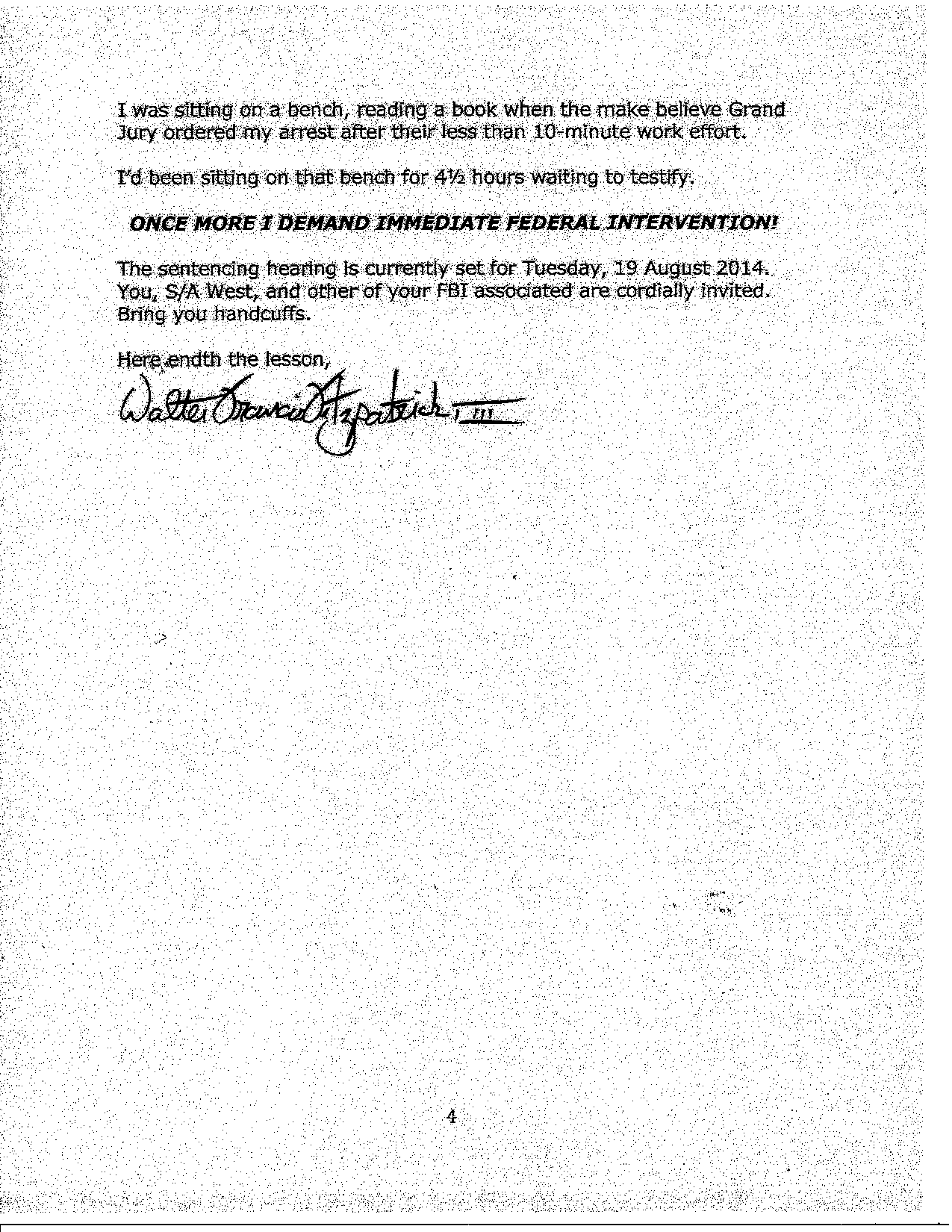“BRING YOUR HANDCUFFS”
by Sharon Rondeau

(Jul. 13, 2014) — On June 24, CDR Walter Francis Fitzpatrick, III (Ret.) was convicted of “aggravated perjury” and “extortion” for attempting to submit a packet of evidence incriminating public officials to the McMinn County, TN grand jury.
McMinn is one of four counties in the Tenth Judicial District in southeastern Tennessee. The region is known for methamphetamine production and distribution in which those charged with enforcing the law and protecting the public appear to be participate by means of a prisoners-for-profit scheme which keeps local jails overflowing with inmates awaiting trial or convicted of crimes, real or imaginary.
Since 2009, Fitzpatrick has exposed systemic corruption in the Tennessee judiciary, which includes the formation of the county grand juries. Criminal court judges routinely inject their own hand-picked foreman into the group of 12 individuals allegedly selected by “automated means,” as is required by law. Complaints of undue influence on the McMinn County grand jury by the foreman and a prosecutor were made public in 2012 but dismissed by Tennessee Attorney General Robert E. Cooper, Jr. after he allegedly investigated criminal accusations against then-District Attorney General R. Steven Bebb.
The District Attorneys General Conference describes a grand jury as consisting of 13 members, all of whom are chosen by automation and one of whom becomes the foreman.
Within the district, grand juries are chosen in December for the coming year and serve during alternating months. Therefore, the grand jury which Cunningham told of Fitzpatrick’s “history” after refusing to allow its members to review his January 21 submission which accused Cunningham, among others, of criminal acts, was prejudiced when it allegedly deliberated on whether or not to indict him in March when he returned with more evidence.
Bebb abruptly resigned at the end of May, effective on June 6, coinciding with the time at which Fitzpatrick’s attorney, Van Irion, was issuing subpoenas to grand jury members and others to testify.
Bebb issued a subpoena for Judge Amy Reedy to appear as a witness, but she never made an appearance.
Last year, Cooper concluded that the allegations against Bebb did not rise to the level of criminal prosecution and that Bebb was “answerable to no superior.” However, in the case of Marvin Young, who has been wrongly accused by the Monroe County grand jury after having discovered fraud and forgery behind his father’s will, Cooper told Young that because Bebb was “elected,” he did not have the authority to investigate him.
Decades ago, Tennessee criminal court judges “created” the position of grand jury foreman and reserved the right to select the person to become their personal employee “from wherever they choose,” defying the Fifth Amendment intent of an unbiased group of people who would review evidence and “make inquiry” into matters placed before them prior to the filing of formal charges against an individual. Today, grand juries serve as an arm of the government against the people, and, as is evidenced in Tennessee, are obviously influenced heavily by the “judge advocate” foreman.
After their empaneling, the grand jurors are not told that the foreman is a court employee, which was part of the information Fitzpatrick wished to impart to the McMinn County grand juries in his attempted submissions.
On March 18, Bebb signed the grand jury presentment charging Fitzpatrick with aggravated perjury, extortion, stalking and harassment of the then-grand jury foreman Jeffrey Cunningham. At Fitzpatrick’s “trial,” no documentary evidence was presented to support the charges, and Cunningham stated that he could find nothing in Fitzpatrick’s submissions, which included articles from The Post & Email, that contained untruths. Prosecutor A. Wayne Carter claimed in his closing argument that Fitzpatrick’s submissions had caused Cunningham to resign his post as grand jury foreman.
Judge Jon Kerry Blackwood presided over the trial, despite having denied Fitzpatrick a restraining order against Cunningham which Fitzpatrick requested after Cunningham threatened to have him arrested in February should he return to submit anything to the grand jury. Aware that he was named in criminal conduct in the submissions, Cunningham was required by law to step aside but failed to do so. Blackwood similarly did not recuse himself and refused to remove the Tenth Judicial District from prosecuting the case “vindictively,” as Irion claimed.
In 2010, Blackwood had denied Fitzpatrick his Sixth Amendment right to defense counsel and has done the same to other defendants.
Cunningham is a licensed attorney active in the Tennessee Bar Association with a special interest in “criminal prosecution.” Several months ago, The Post & Email received no response from the Tennessee Administrative Office of the Courts after asking how an attorney could serve as grand jury foreman without a conflict of interest.
On June 23, Blackwood dismissed the charge of stalking. On June 24, the jury acquitted Fitzpatrick on the harassment charge but convicted him of aggravated perjury and extortion.
Judge Carroll Lee Ross, who will retire with a pension paid by taxpayers at the end of August, has routinely denied defendants their constitutional right to defense counsel, including Marvin Young. On one occasion in 2011, he ejected Fitzpatrick from the courtroom for taking notes with a fountain pen, claiming that it was an objectionable “recording device.” A sympathetic reporter from a local newspaper with an audio-recorder, however, was allowed to remain for the hearing.
Unlike other states, Tennessee’s attorney general is appointed by the state supreme court, melding the judiciary with the executive branch of government. The attorney general serves for a term of eight years. Cooper’s term is ending this year.
The Code of Judicial Conduct put forth by the Tennessee Supreme Court states, in part:
[1] An independent, fair and impartial judiciary is indispensable to our system of justice. The United States legal system is based upon the principle that an independent, impartial, and competent judiciary, composed of men and women of integrity, will interpret and apply the law that governs our society. Thus, the judiciary plays a central role in preserving the principles of justice and the rule of law. Inherent in all the Rules contained in this Code are the precepts that judges, individually and collectively, must respect and honor the judicial office as a public trust and strive to maintain and enhance confidence in the legal system.
On December 7, 2011, Fitzpatrick observed Judge Amy Reedy hand-picking slips of paper containing the personal information of people selected as “finalists” in the jury selection process. By law, the final names are to be drawn out of a box blindly.
For more than four years, Fitzpatrick has contacted the Knoxville FBI and recently, the Chattanooga FBI office, requesting an investigation into judicial corruption involving racketeering, money-laundering, denial of constitutional and civil rights, and its possible connection to the murder of Jim Miller, an elections commissioner who may have been preparing to reveal corruption within the Monroe County Sheriff’s Department.
After overhearing names of those believed to have committed the “government hit” against Miller, Fitzpatrick reported them to the FBI, which never responded. However, two of the three men Fitzpatrick named went to federal prison on drug charges, with one verbally “slipping” after a raid for drug paraphernalia was conducted on his home yielded charges, a trial and conviction last November.
Fitzpatrick had correctly named Boonie Stokes and Brandon Steele as the chief suspects in the crime, but the FBI never acknowledged his contribution to solving the Miller murder.
Although recent calls to the FBI have resulted in the response that judicial corruption in the Tenth District is “a state matter,” FBI investigations carried out during the last decade have focused on the same types of corruption in other areas of Tennessee. Between 2002 and 2008, “Tennessee Waltz” targeted “widespread public corruption” in Shelby County dealing with a contractor who billed for services not rendered and culminated in the “convictions or guilty pleas of a dozen state and local public officials—including several state senators, a state representative, two county commissioners, and two school board members” which led to “new state ethics laws and the creation of an independent ethics commission in Tennessee.”
“Tennessee Waltz” is one of a number of official “state songs” of Tennessee.
The FBI reported that it worked with the Tennessee Bureau of Investigation (TBI) to achieve its goal of identifying corrupt government officials in Tennessee Waltz. “Public corruption continues to be our top criminal priority,” states the FBI on its webpage detailing the operation.
During its investigation, FBI agents asked an informant to “wear a wire” to capture conversations among suspects in the corruption ring.
In Cocke County, which is several counties northeast of the Tenth District, the FBI launched an operation dubbed “Tradin’ Paint,” which “prosecuted 28 individuals for racketeering, drug trafficking, operating chop shops and other motor vehicle offenses, and insurance fraud.”
Operation “Rose Thorn,” also centering on Cocke County, lasted seven years as “a sweeping effort to root out crooked lawmen” to apprehend car thieves, drug dealers, illegal gamblers and prostitution rings. The FBI had determined that the Cocke County Sheriff’s Department was “systemically corrupt.” In 2008, The Knoxville News Sentinel reported that the FBI found “a local law enforcement structure that appeared corrupt from top to bottom, with reports of officers taking payoffs and bribes to protect almost every type of criminal activity imaginable. Some of the officers, including the upper ranks of the Sheriff’s Department, were rumored to be actively involved in organized criminal enterprises.”
Concluding in 2008, then-U.S. Attorney for the Eastern District of Tennessee H. Russell Dedrick said he hoped that Rose Thorn had “eradicated” a “culture of corruption” in the county.
For more than four years, Fitzpatrick has provided evidence to the Knoxville FBI on the judicial corruption which incarcerates individuals, guilty or innocent, without constitutional due process. On June 28, 2011, Special Agent Roxane West asked Fitzpatrick if he were willing to “wear a wire” to capture judges hand-selecting jury members, to which he assented. During a probable cause hearing in January 2012, Judge J. Reed Dixon stated that Fitzpatrick, who was arrested for taking evidence which showed that jury members were specifically selected by Reedy and then charged with “tampering with government records,” would receive the benefit of having the evidence presented to a new grand jury, as the grand jury members so selected were compromised. Stunningly, after Fitzpatrick asked how the new grand jury would be selected, Dixon told the court, “The judge picks the grand jury.”
The Post & Email and others obtained a recording of the hearing containing Dixon’s statement. A local individual delivered it to West at the Knoxville FBI, who took no apparent action. A telephone call from The Post & Email stating that we had the additional evidence of judicial corruption which she had told Fitzpatrick was needed was not returned.
Corrupt grand juries continue to indict individuals within the Tenth District, likening it to a penal colony.
In the case arising from the documents taken from the courthouse which were intended for the FBI, Fitzpatrick was tried and found guilty after a jury deliberated for five minutes and Irion was not allowed to present a defense, in violation of the Tennessee constitution and state law.
Last week, The Post & Email was a guest on the Abel Danger radio show to explain what the jury’s verdict means to Americans across the country: that the First Amendment’s provision allowing any citizen to petition his government for a redress of grievances is now nullified.
Several weeks ago, a petition was launched at change.org demanding that Judge Jon Kerry Blackwood, who was compromised and should not have heard the case; deputy prosecutor A. Wayne Carter; the Tennessee legislature, and the Tennessee Supreme Court “stop conducting kangaroo courts with rigged juries and vacate [the] conviction of CDR Walter Francis Fitzpatrick, III (Ret.)”
On June 9, Fitzpatrick and another victim of judicial corruption visited the Chattanooga office of the FBI and met with Special Agent Gary Blevins for more than two hours. Blevins reportedly took at least 15 pages of handwritten notes and appeared intrigued by the information Fitzpatrick and his companion provided.
In the past, Monroe County Sheriff’s Deputies have stated with bravado, “We’re not afraid of the FBI.”
On Saturday, Fitzpatrick wrote and mailed the following document to Blevins:
Fitzpatrick’s sentencing hearing is set for August 19. Col. Field McConnell stated during his radio show last week that he will be going to Athens, TN to spend time with Fitzpatrick prior to the sentencing and to stand with him in court that day. Paraphrased, McConnell said, “I will stand there and not say anything, but if the judge asks me to speak, he’s going to regret that he did.” McConnell then mentioned the possibility of “10,000 other veterans” following him to Athens to protest the conviction, sentence and incarceration of an innocent Navy veteran.
Contact information for West and Blevins is as follows:





